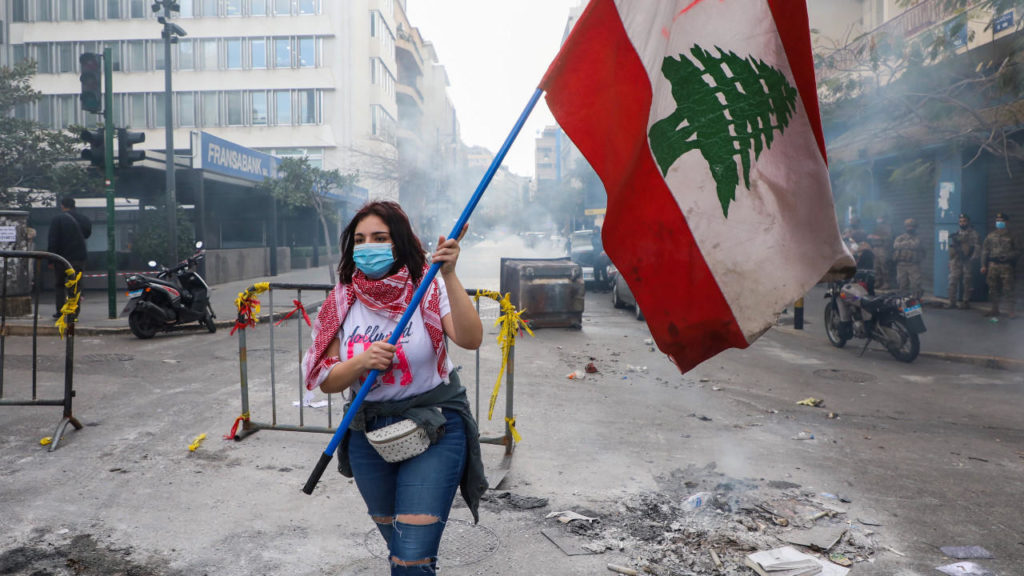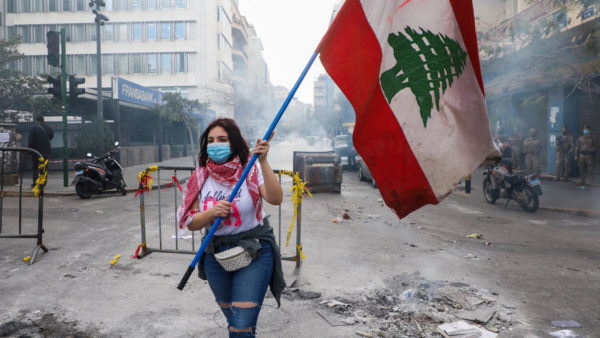
Lebanon remains at a political impasse as squabbling continues between President Michel Aoun and Prime Minister-designate Saad Hariri over the formation of a new government even as the country suffers the worst economic crisis in its history, exacerbated by the devastating August explosion at a Beirut port.
Lebanon’s political class has still failed to form a government, seven months after prime minister Hassan Diab’s resignation amid outrage over the port blast and despite the country grappling with an economic crisis that has seen the Lebanese pound lose 80 percent of its value since 2019.
A sense of crisis has wracked the Lebanese political class since an unprecedented protest movement erupted over corruption and diminishing living standards in October 2019, with demonstrators angry at politicians on all sides of Lebanon’s sectarian divides.
‘Questions of ego’
Political leaders are fiercely divided over the composition of Saad Hariri’s government – even rowing over the precise number of cabinet ministers. As the international community pressured Lebanon for political reforms in exchange for aid after the Beirut port explosion – notably French President Emmanuel Macron, who visited Lebanon twice in the aftermath of the disaster – Hariri agreed to form a new a government that would implement structural changes.
In exasperation, Aoun issued an ultimatum to the prime minister-designate and former premier, urging Hariri to either form a government immediately or resign.
“Lebanon’s political class continues its long habit of bickering and fighting for resources, but – with hyper-inflation and rampant poverty – it’s like they’re squabbling over a field of ruins, where there isn’t much left to divvy up or to steal,” said Karim Émile Bitar, head of the Institute of Political Sciences at Saint-Joseph University in Beirut and an associate researcher at IRIS (the French Institute for International and Strategic Affairs).
“Instead of agreeing to form a government to salvage what is left of Lebanon, politicians are consumed by questions of ego,” Bitar continued. “They’re not worrying about the generations to come; they’re always thinking about the next elections.”
Formed as part of the peace deal that ended the 1975-1990 civil war, Lebanon’s political system divides power between its three main religious communities – requiring a Maronite president, a Sunni prime minister and a Shia speaker of parliament. Hariri, who is the de facto leader of the Sunni Muslim bloc, and Aoun, a founder of the Maronite Christian bloc, accuse each other of blocking the formation of a new government.
“Hariri wants his 18-member cabinet to be mainly composed of technocrats who don’t belong to Lebanon’s political class,” Bitar said. “Aoun wants to appoint the Christian ministers himself – while reminding Hariri that the PM-designate is very much a member of the political class and not a technocrat, and that he has appointed ministers from his Sunni community.”
The vested interests that various Middle Eastern powers have in Lebanon is another reason for the failure to form a new government. Bitar said that US President Joe Biden’s desire to rejoin the Iran nuclear deal has prompted Lebanese politicians adopt a wait-and-see attitude towards what happens in any US-Iran negotiations since revamped nuclear agreement could lower tensions in the region and shift the dynamic of Lebanese politics.
“The only way we could see the various sides of Lebanon’s political divide coming together is if there is a regional détente that allows the foreign sponsors of Lebanon’s different confessional groups to get them to stop arguing,” Bitar said. “That’s been the pattern throughout recent Lebanese history – from the 1989 Taif agreement that started to wind down the civil war to the Doha agreement that averted a potential civil war in 2008: International players get involved to end a dispute that the Lebanese can’t resolve themselves.”
‘Waiting for Godot’
Lebanon has long been a French foreign policy priority due to the strong cultural ties that remain between the two countries since France’s rule over the country from 1923 to 1946 under a League of Nations mandate. But Macron’s efforts to encourage reform have gone nowhere. He accused the Lebanese political class of “betrayal” for failing to get the ball rolling with reforms during his second visit in September.
“Lebanon’s political class – which is totally incompetent when it comes to governing but very effective at staying in power – was playing a game in which it pretended to listen to Macron while in the glare of the world’s attention after the Beirut blast, without actually doing anything to follow through,” Bitar said.
When Joe Biden beat Donald Trump in November’s US presidential elections there was similar talk of Washington breaking the deadlock and strongarming Beirut into making reforms, Beitar recalled. But again, nothing happened. “Now we’re being told we should wait for the Iranian presidential elections in June,” Beitar said. “It’s like ‘Waiting for Godot’.”
“The next Lebanese government is going to be a poisoned chalice,” Bitar went on. “And that complicates things even more – because everyone knows that whoever is in the new cabinet, however good or bad they might be at their jobs, will have to manage a very troublesome state of affairs. So chances are they’ll become extremely unpopular very quickly.”
Hence Diab’s complaint to the Financial Times on Wednesday that the failure to form a new government means he had to remain prime minister on a salary of less than $1,000 per month: “It is the only job in the world where you resign and then you’re stuck,” he put it. “You have to handle all the problems and you can see the problems and how they’re compounding.
Diab faced new demonstrations this week over hyperinflation, which saw protesters try to storm the economy ministry building on Wednesday. Inflation reached 146 percent in 2020, official statistics show. With Lebanon recording more than 400,000 Covid-19 cases, economists say the pandemic has amplified the economic crisis.
“Many Lebanese are dumfounded as they see their currency collapsing further and further every day, as their savings evaporate,” Bitar said. “It’s a surreal situation. Diab’s government has admitted that it’s totally impotent – with an energy minister who announces that the electricity will be cut in a fortnight, an interior minister who says security forces are no longer able to ensure people’s safety, and a prime minister who has handed in his resignation and doesn’t want to be doing the job.”
Bitar is pessimistic about Lebanon’s future. “You can see a certain revolutionary sentiment reviving over recent days, but people are weary after all the social and economic problems they’ve been through – they’re not convinced that demonstrating en masse would change anything.”
“An opposition with a clear vision and leadership has not yet emerged to take over Lebanon if protests develop real revolutionary momentum,” Bitar concluded. “The Lebanese people understand this. But that’s worrying, because it means that the country is trapped in its current state – a kind of numb anger, which could easily turn into either mass depression or an explosion of violence.”
FRANCE24


Leave a Reply
You must be logged in to post a comment.